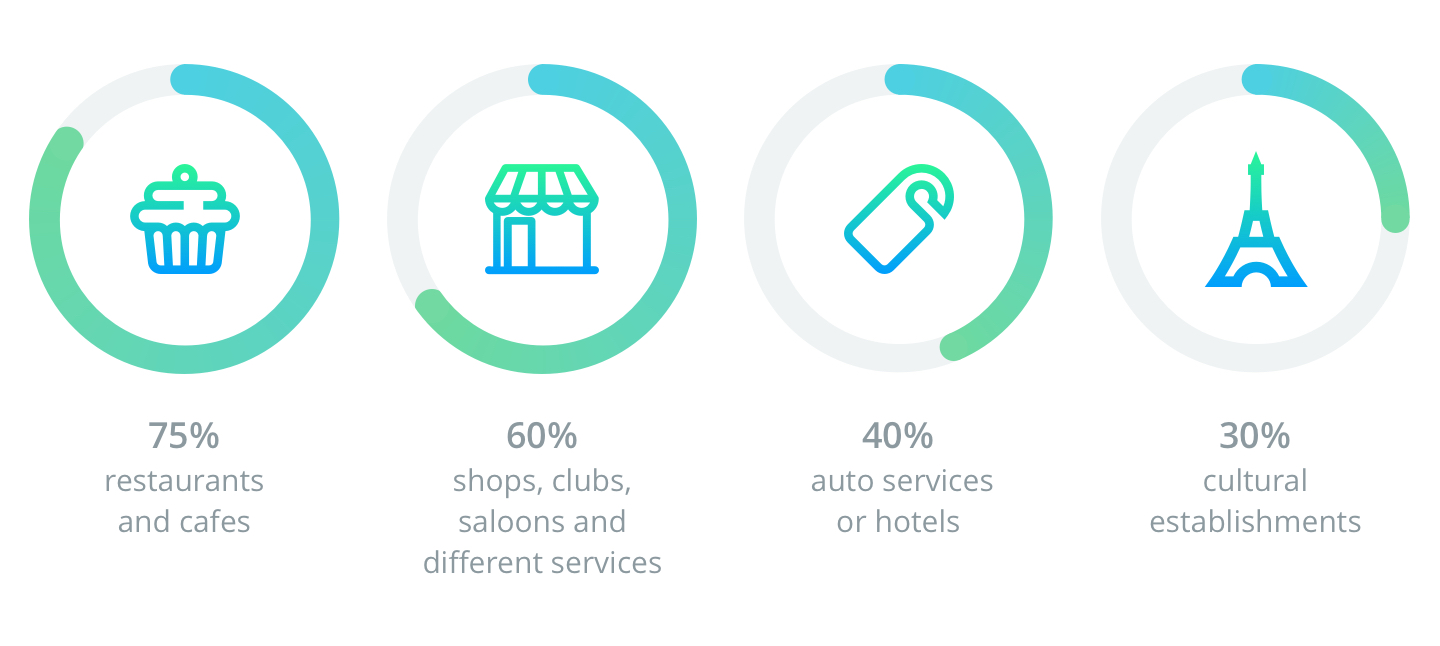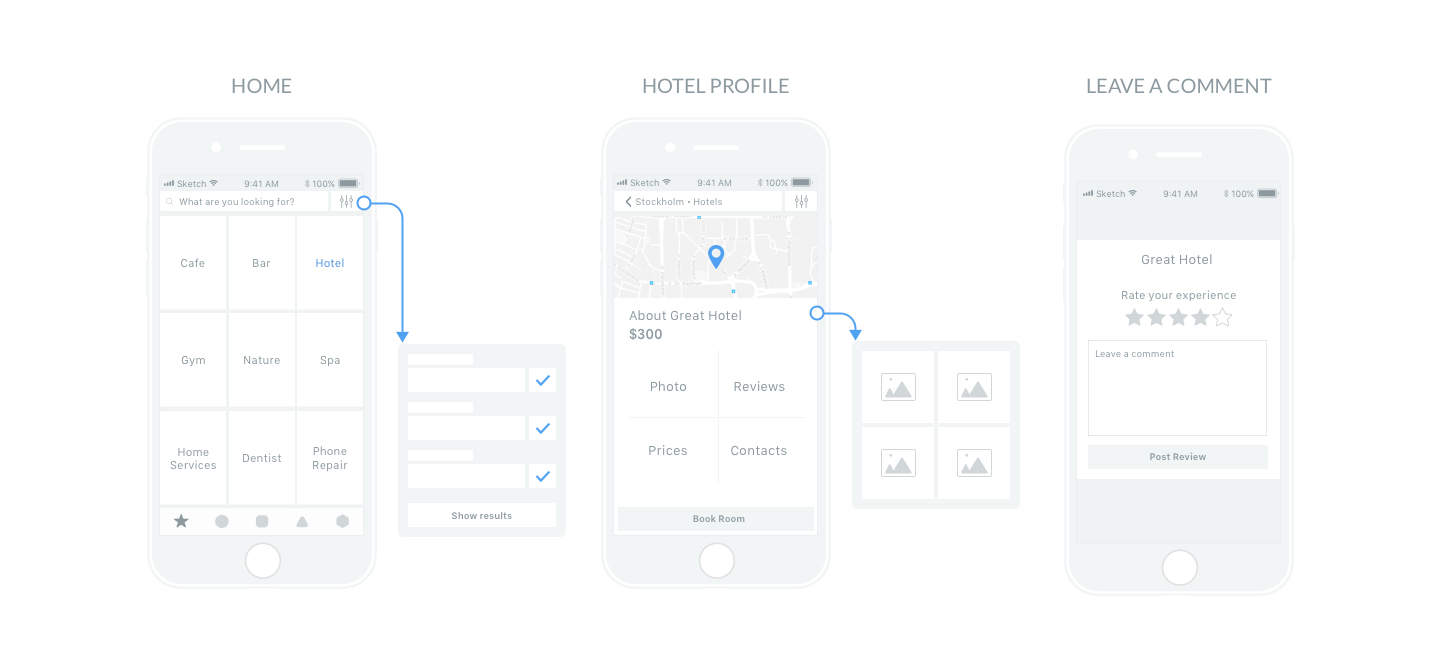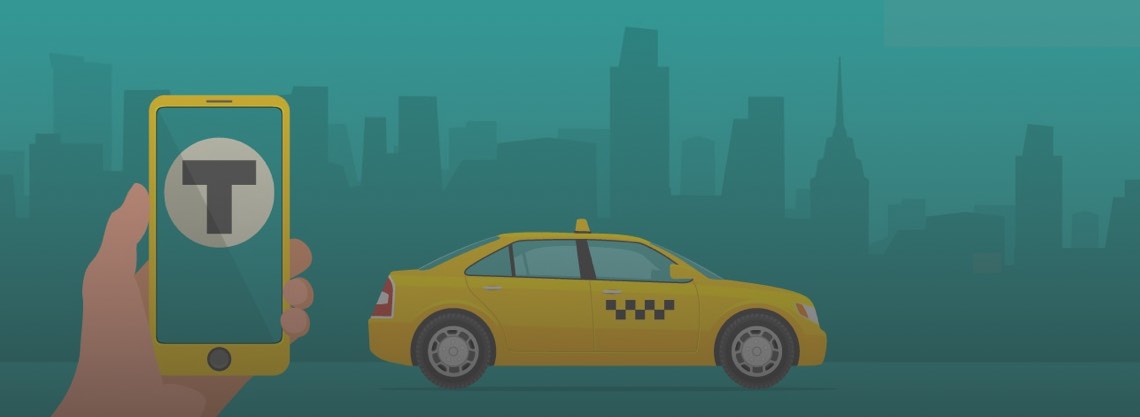Location awareness is what most users expect from their mobile applications, so a question of how to make a location-based app is arising naturally when you are choosing a market niche. Yelp and Foursquare are the most famous examples of location-based services as they get more than 140 million unique users per month each. These apps help in navigating people’s moving as their database has plenty of useful information.
According to the statistics, people look for restaurants and cafes most frequently (75%), 60% of users inquire about shops, clubs, saloons and different services. Around 40% of users want to find auto services or hotels. Fewer people, 30%, are interested in cultural establishments. These numbers show what people need most and what we should emphasize in creating location-based apps.

It is worth mentioning that people are not only willing to find certain places. The owners of such places get profit from these apps, too, and a higher rating means more clients. For example, if a restaurant gets one more star, the number of customers will grow up to 8%. Another way to attract more clients is to post an advertisement in these apps. Even though it is not free, the benefit from it will be high. With the advertisement, it might bring $20 000 more per annum.
The existence of Yelp and Foursquare does not discourage people from creating location-based apps. On the contrary, more and more people are willing to give it a try. That is why we've decided to describe in detail how to create an app like Yelp and how to create an app similar to Foursquare and Yelp.
Geolocation apps
More than 1.2 billion people travel every year. Usually, people do not know the places they visit well enough. They can buy a map of this place and explore it themselves or use an app to make everything much easier. However, location-based apps come in handy not only in new cities but also in hometowns as there are always a big variety of places to visit. Users do not know even half of them. That is why it is useful for them to read comments concerning places they are interested in and to see the number of their stars.
What is a location-based app?
Geolocation apps consist of two parts: maps and databases (establishments, their ratings, and comments left by previous users.) Users can download this kind of apps or use web apps to look round the city and to see what they have not far from their hotels. They can find some places knowing their address or with the help of location.
However, this can work only when they know where they are going. If no, they read the description of some places nearby and read what other people think about them; then they choose a place.
Special features of apps like Foursquare and Yelp
There are a number of features that go down very well with customers. It’s necessary to mention that users of Yelp and Foursquare can sign up for leaving comments, rating different establishments and talking to other people; however, it is possible to find the necessary information without being signed up. Let us look at some features the apps can offer:
1. Compliment feature
Compliment feature shows what other people think about comments posted by a particular user. As comments should be reasonable, this feature may help people understand whether they can trust these comments.
2. Account advantages
Having an account enables users to have friends and to see how many people have visited their profile. They can also see the number of other people's friends and visitors. If using their Facebook account, users also see where their friends go.
3. Useful information
These apps provide some useful information. Besides working hours users can see the menu or its part and at least approximate prices. They also get information concerning reservation, parking, Wi-Fi, accepting different ways of payment, having alcohol or place for dancing.
Yelp is monthly visited by 145 million people while Foursquare has 55 monthly active users. These numbers show that the apps are successful and the features listed above contribute to these statistics. That is why more and more people are interested in how to create a location-based app. We will explain by describing some steps of the process below.
User’s part and location-based app monetization
Location-based app development is becoming more and more popular. These apps have different structures but also they have common features and we will describe them relying on their commonalities.
1. User flow.
Let’s imagine a user decides to go to a new city and is looking for a nice hotel to stay at. First, he chooses his destination, then the establishment he is looking for (cafe, restaurant, gym, hotel). Money is an important factor here so he chooses how expensive this place could be (inexpensive, moderate, or pricey), there are some more features if needed like Wi-Fi, late working hours, and neighborhood. The user sees some variants that might suit him.
After looking at pictures of these hostels, reading comments about them the user makes his choice. There is a map of the hostel and its address and phone number to find out the price and the details the user is interested in. Then he comes to the hostel itself. After it, he might register in the app he has used, and leave a nice comment about this place.
The same steps are taken for finding a cafe or any other establishment. However, sometimes users do not look for something in advance. They might be walking in a new city during a business trip and decide to have a cup of coffee. They just open your app, it finds their location and shows what cafes there are close to them. After using filters, reading comments and looking at photos, they go to this cafe and spend hopefully a nice hour in a well-chosen place.

2. Monetizing.
In 2017 Yelp earned 714 million dollars and Foursquare will soon reach 100 million dollars in revenue. So, a geolocation-based app can be monetized in one of the following ways:
1. advertising
2. reservation
3. sponsored search
4. in-app purchasing
5. premium version
Advertising is one of the most popular ways to get profit from your app. Owners of some establishments pay for having their cafes or restaurants shown on certain pages. Advertising gives the biggest part of the profit of such apps.
Reservation lets people reserve for example tables in a cafe online for paying monthly a fixed sum.
Sponsored search means showing certain establishments on the first page. Sponsored search along with advertising is the main source of Yelp and Foursquare income.
In-app purchasing enables users to get more possibilities while using their apps.
Premium version means seeing no disturbing ads after buying it.
The most beneficial ways of monetizing location-based apps are sponsored search and advertisement (15 and 70 % respectively) as owners are ready to pay to attract more customers who use such apps. However, other ways can bring some profit, too, so you should think about what the users of your app might need.
Another question is how users pay. First of all, it is sometimes impossible to get an app for free. However, this might discourage people from getting one, so there should be other possibilities they pay for like premium versions, in-app purchasing and reservation.
How to create an app like Yelp and Foursquare?
You might have at least two questions when you look for location-based app development: how much it costs and how exactly it works.
1. Costs.
There are different ways to make location-based apps, so the price and the time it will take to finish your project will depend heavily on which way you opt for. The first question is whether you prefer an MVP or a fully functional application. It might be a bit better to begin with the MVP as it is not that complicated. It has only necessary features like security and access control and because of that, it's cheaper than a fully functional app where users see a lot more features (for example, changing background). However, you will be able to improve your MVP later on.
The approximate cost for location-based app development would be $25 000-30 000. The approximate time would be 4 to 6 months. The price and timeline depend much on what operating system you choose. Android app development costs, for example, a bit more compared to iOS. Moreover, it is not the work for only one expert but for 4 or even 5 because they have to deal with different parts of app development if it is not a web app: back-end, front-end, mobile iOS or mobile Android and QA specialists. Keep in mind that this concerns MVP. Its functional prototype would require more money and work depending on the project's complexity.
2. Process itself.
First of all, we need a map and the user’s location on this map. Nowadays, we have several solutions to this issue. First of all, it can be addressed by using Google Maps. Routing engines like Waze and Mapbox (Foursquare uses Mapbox) are also popular in this sphere. They share a lot of features but they also differ in a way. For example, Mapbox supports map styles and Google Maps does not.
Using maps for location-based app development is not free, that is why you have to choose a map with the features that would suit your app best. If you do not want to use such maps, you can have a map created for your app specifically.
Besides the map and the user’s location, we need a database. We can use the database we create or get one from special sources. This database includes some general information about establishments, their rating and the comments left by the users. It is possible to get this information from Foursquare, under some circumstances it would be even free of charge. However, it will be necessary to pay for some data.
Conclusion
Giving you a brief overview of how to make a location-based application and what it actually is, we want to put you in the picture and help you set up the app development. If you have decided to build a location-based app and maybe have come up with some creative ideas, contact us to enter into constructive and effective cooperation developing a great app! We have the necessary expertise and relevant experience in this sphere. Please, check one of our case studies to see more information on our involvement in the project that emphasizes the provision of intelligent transport solutions on the group of location-based applications.

© 2019, Vilmate LLC




